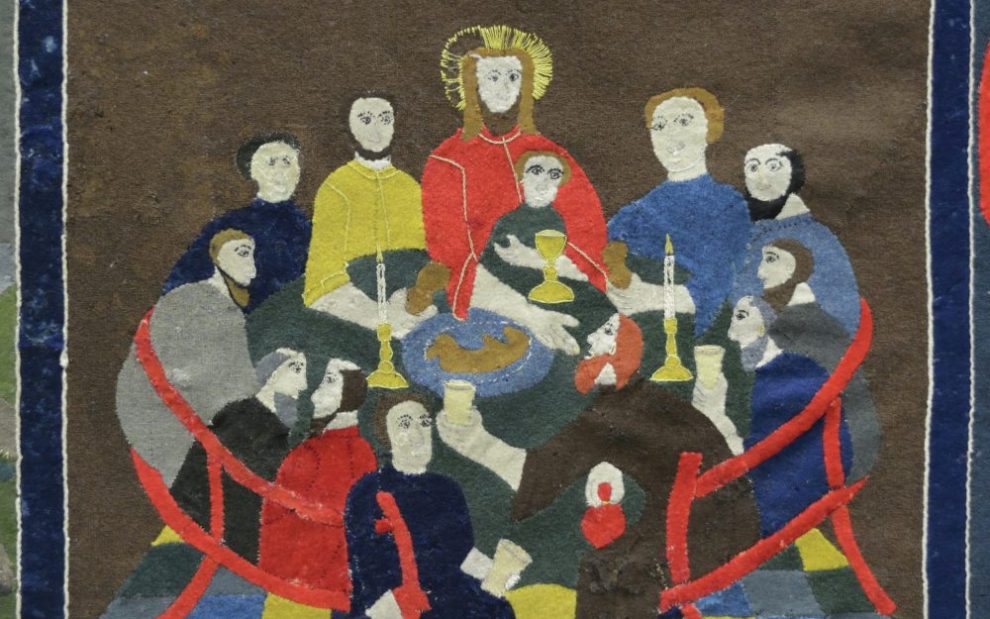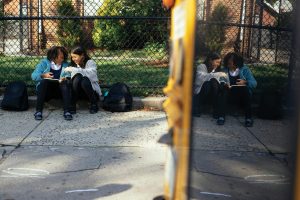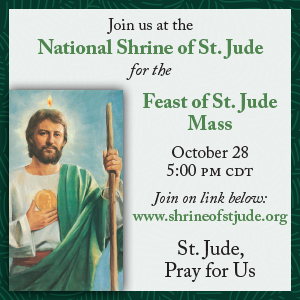What I miss most about going to church is the choir. During this long year of pandemic, when I only entered our parish building twice, that’s the piece of liturgy I wished most to restore to my Sundays.
That’s not a very pious thing to say, but I’m not a pious person. I know the right answer should be that I missed the sacrament, the true presence of Christ under the forms of bread and wine, the paschal mystery delivered concretely like a fragment of heaven into my hand. At the least, I should say I missed listening to my pastor’s homilies or seeing the faces of friends in the assembly who compose the visible expression of church on Earth to me.
But the truth is, I missed the choir. In many parishes over 60 years, I’ve had a seat with the singers. Until that fateful Sunday in March 2020, which would be the last time our choir would meet, I’d sat at Mass, music binder in lap, ready to take up my part.
Chris sat next to me in the soprano section. I followed her sure melody line and never got lost. Miriam always arrived late, scrambling to get organized, but was cheerfully welcomed on my other side. Between these two, I didn’t have to worry when my weaker voice broke or slid off note. Liz, down the row from us, was the entire alto section. Her deeper tones anchored us and made every hymn sound a hundred times better. It took strength and courage to hold on to the often strange sequence of alto notes all by herself.
Behind us were the men: Charles, Joe, and Bob, loyal tenors rain or shine. Charles, supported by his gentlemanly cane, was the learned one. Joe, whose brother had been the former pastor, also sang in the cathedral choir downtown. Bob, husband to Liz, was easily the funniest member of our group. Mark joined us more recently but had already become a switch-hitter: sometimes singing with the men, at other times picking up the alto line with Liz for more demanding pieces.
Claude, our kindly director, accompanied us on commanding organ and tinkling piano. He also drove out of his way each week to pick me up for Monday night choir practice. Bob and Liz, with a car full of grandchildren’s gear that often had to be dislodged to make room in the back seat, drove me home.
When I think of in-person church now—what a weird notion, that church could have become anything but!—I think of Chris, Miriam, and Liz; Charles, Joe, Bob, and Mark; and dear Claude. I felt lost without hearing their voices swelling around me, enabling me to find my place in that great musical story week after week. Sundays without them, with only a computer Mass for company, became remarkably sterile.
Because of the absent chorus of these friends, I came to understand a word that never meant much to me before: sacramentality. Please know that, while I got an A in sacraments class half a lifetime ago, I only earned a B in liturgy. I learned enough to teach sacraments as a catechist, but maybe not enough to appreciate what they embody: the radiant notion that common things hold sacred meanings.
What meets our senses makes God present to us.
Water, bread, wine, oil, touch, a ring, a kiss, the laying on of hands: These tangible signs tell us something for which words can provide only the barest outline—that God is genuinely with us.
God is here: “not in some heaven, light-years away,” as the Marty Haugen hymn “Gather Us In” assures us. What meets our senses makes God present to us. The familiar smell of incense, candles, and old wooden pews. The welcoming warmth of hugs and handshakes. The brilliant colors of flowers, banners, and the assembly’s Sunday finery. The taste of bread and wine on the tongue. And yes, the sound of the organ and choir in its best—or comically worst—renditions of hymns that punctuate each movement of liturgy and buoy us along from entrance to offertory to communion to processional.
I missed it all. Of course I was grateful for the well-meaning, necessarily live-streamed and Zoom Masses I participated in each Sunday and holy day during long months of confinement. But Mass on a computer doesn’t provide Eucharist in my hand or Liz’s astonishing alto in my ear. I can’t feel the rumble of the organ in my chest, and I don’t catch the churchy smell of an old building that’s surely seen better days but never a more earnest community of faith.
Christians accustomed to sacramentality in their worship bravely experimented with options during a season of deprivation. There were drive-through confessions and take-home communion kits. Many of us started Lent this year with ashes sprinkled into our hair or delivered in tiny envelopes for personal administering. Some families—very, very quietly—shared agape meals of buns from the bread box and wine from the liquor cabinet while they watched Mass on TV.
No one I’ve talked to about this was deceived that somehow their poppy seed rolls and merlot were consecrated by proximity to their laptops. But it just didn’t seem right to them, not simply enough frankly, to come to the virtual table of the Lord and find a prayer for spiritual communion on the proffered Zoom plate.
We remain careful, since we’ve learned the hard way that loving our neighbor as ourselves sometimes means not offering that embrace or huddling for that intimate conversation we long to have.
Maybe the good news here is that the lessons of sacramentality we learned in parochial school and religious education programs really did stick after all. Sacraments are outward signs that give grace—this sentence was hammered into our heads until we believed it. So don’t tell us now that we can sit with our hands folded in our laps on the sofa, watch the Mass drift by on the screen, and it will be enough. It hasn’t been and won’t be.
By now, many of us may have felt ready to return to the pews. If you’ve had your vaccine shots, if your parish has followed reassuring protocols, if your local rate of infection is low, if your nerve has finally caught up with your need, you may once more be occupying your old spot, breathing in the familiar air, and hearing the organ generate chords that infiltrate the body of the assembly like musical tendrils.
Maybe we can’t yet squeeze the hand of a neighbor. Maybe the choir can’t resume its old positions and put their harmonies together as before. No doubt each dear face in the assembly is still masked, and each friend more distanced than we might prefer. We remain careful, since we’ve learned the hard way that loving our neighbor as ourselves sometimes means not offering that embrace or huddling for that intimate conversation we long to have.
This year, Corpus Christi may still feel like an awkward celebration. The body and blood of Christ may never be experienced the same way in parishes accustomed to receiving the sacrament under both species. The shared cup is likely gone for good. Yet the shared song is still ours to sing. Each of us brings grace notes to the tangible body that only we can contribute.
One day, hopefully soon, we’ll take up our places again, weak voices made stronger by this communion. That day is not in some heaven, light-years away. Let’s trust this.
This article also appears in the June 2021 issue of U.S. Catholic (Vol. 86, No. 6, pages 47-49). Click here to subscribe to the magazine.
Image: Wikimedia Commons

















Add comment